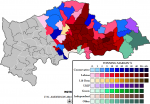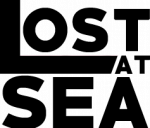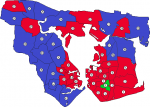Extract From: The By-Elections That Rocked the World (The Guardian)
Initially many suspected that the first by-election of the 2000 Parliament would come in the form of Portsmouth Fareham, after MP and Father of the House Jim Callaghan contracted pneumonia during the first bitter winter of the new millennium. The Labour Government, already sinking in the polls from their victory in the 2000 election, rushed to pork barrel the seat- although one of the safest in the country, much of the Labour vote was recognised to be tied to Callaghan himself who had, except during the brief time in the late 70s when he had served as Mayor of Portsmouth, been the Member of Parliament for the seat since the 1946 Election. Callaghan himself found the preparations for the by-election amusing, and indeed at a surgery embarrassed Council Leader Leo Madden by introducing him as his "esteemed anointed successor" (Madden would indeed succeed Callaghan when he passed away in 2004). Portsmouth Fareham would not be the first by-election of the new Parliament. However, when asked where he believed the first by-election would be in response to speculation, Callaghan would accurately predict that it would be "...somewhere up in the north, like Berwick."
The sudden resignation of Christine Creech, MP for Berwick-upon-Border, blindsided many, however was not unexpected. Member of Scottish Voice, an SNP backed political organisation that operated exclusively in the Berwick Special Zone, Creech's resignation came following several fraught months of negotiations in an attempt to sit in Parliament as an MP without swearing an Oath to the Monarch. When she was unsuccessful, instead of continuing her abstentionist policy, Creech resigned, allegedly prompted to do so by the Speaker of the House during a final heated negotiation session. The by-election was called for the 7th June, with a short campaign of a month. Scottish Voice nominated the Dumfries-born solicitor and activist Gordon Mundell. Although self-defining as a "small u-unionist", Mundell's support for Brewick's permanent transfer into Scotland, having been thrust into the political spotlight by acting witness at the Committee for Constitutional Affairs over the matter, is likely the reason for his apparent idiosyncratic nomination, one that was, in later years, revealed to have been orchestrated by SNP Depute Gordon Brown in a deliberate attempt to sabotage Scottish Voice.
The Unionist Party nominated Donald Cameron. Born in London to upper middle class Anglo-Scot parents like many of the current British Establishment, he studied at Oxford and was employed by the British Colonial Administration in first Hong Kong, and then Nigeria. Returning to the Home Islands, Cameron worked for London Mayor Roy Major until the start of the Mayor's third term in 1996 when he was selected for the List of and unexpectedly won a seat as a Scottish MEP in the European Congress. This job change likely saved Cameron's political future when Mayor Major resigned in a maelstrom of scandal the following year. Reelected to the Congress in May 2001, Cameron was selected for the by-election by the local Unionist Association. Markably more liberal than previous Unionist candidates in Berwick, Cameron's main personal focus was to improve upon the increased vote share at the last General Election, which saw the party shift into second place ahead of Labour, with Cameron motivated by the promise of a top-down selection by the safe National Alliance seat of Edinburgh Pentlands, although many of his colleagues considered the seat winnable with the loss of Creech and the selection of Mundell.
The Labour Party nominated perennial candidate Sean Walker, who at the time was serving as the leader of their 3 person caucus on the Berwick Council. Having fallen behind the Unionist Party in the last election, Walker's goal was to reclaim second place, or at the very least hold his deposit. Labour, fearing how a potential loss of deposit would reflect on the Government, would send extensive support to Berwick, with Premier Jackson and her Cabinet visiting the constituency personally. The Alliance for Protectionism (later and more commonly known as the 'Protectionist Party') would nominate their Spokesperson for Home Affairs Paul Stevens, while the Greens nominated local Councillor Rachel Wheeler. Michelle McLowery, a local Nurse, ran as a pro-NHS Independent, while Markus Leggett, unhappy with the selection of Gordon Mundell, ran as a 'Creechite', although failed to qualify as a party candidate and was placed on the ballot instead as an Independent.
Compared to other by-elections in this article, Berwick-upon-Border was a largely placid affair. The question of if Berwick should become part of Scotland quickly became a central issue with the campaign, with Scottish Voice treating the by-election as a referendum on the matter. Although Mundell and Creech disagreed on a great deal, both voiced their support for this radical move, claiming that public services, educational standards, and health care would improve dramatically with the border moved twenty miles, comparing their belief to the recent German and Korean Reunifications. At a special Question Time husting, Mundell would even famously claim that "there is a great sense on the doorstep that Berwick is Scottish, and once in Parliament, I intend to make sure what is strong feelings become legal reality". Cameron and the Unionists took a dim view on this issue; their attempts to fight the by-election on parents choice when it came to education quickly became a sideshow to the issue of Berwick's status. Cameron himself opposed what he called "needless debate" that "detracted from real important issues facing the people that won't be solved with the flick of a wrist the border to our South", although agreed that there was a need to reexamine Berwick's status. At the Question Time, Cameron famously proclaimed that: "I am prepared to make a big, open offer to the people of Berwick- Scottish Voice will not deliver on the promise of moving the border. It has no leverage, no power, and no hope. It is not a Party of Government, nor is it a Party that will ever be a Party of Government. The National Alliance, however, can and will do what it can once it returns to Government to settle this issue fairly. This is not a referendum, as my opponent is so quick to claim, it is a by-election, and we should all be thinking about who can represent this Constituency the best, and if you don't mind, I think I am that man."
Despite a largely innocuous campaign, the results were contentious. With one of the lowest turnouts in post-war by-elections, a drop of over 50%, Donald Cameron was elected with a majority of 134 votes after several recounts that lasted into the weekend. Mundell was narrowly defeated, polling only 8,036 votes, with a percentage drop of 10%, a 13.4% swing to Cameron, while the Labour Party failed to win backs its deposit, shedding 18.6% of its vote for what would in time prove to be Sean Walker's last election campaign. Premier Jackson was reportedly so in despair at the results that she considered resigning. The Protectionists made a strong showing, however failed to win back their deposit, falling a little under half way. Following the election, Leggett was blamed by Scottish Voice supporters for the results, as his poll of 344 votes, had they straight transferred to Scottish Voice, would have granted them a majority of 210. In 2003 he was found dead in his home.
Both Cameron and Mundell would, following the election, lead productive political lives. Cameron was reelected with a greatly increased majority in 2005, and in 2010 became Foreign Secretary. Following the 2009 General Election, Cameron would lobby for Berwick's status to be reexamined. Mundell himself would travel north. Mundell, following a brief retirement, joined the Unionist Party of Scotland, and in 2006 was elected at the Aberdeenshire East by-election. After being made the Secretary of State for the Environment in 2015, both him and Cameron's past competition for Berwick was raised as a point of humour.










